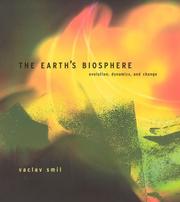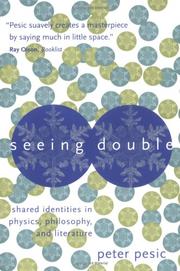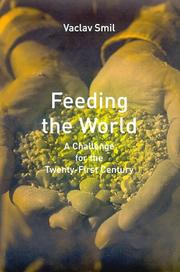| Listing 1 - 3 of 3 |
Sort by
|

ISBN: 0262283824 0585443831 9780262283823 9780585443836 0262692988 0262194724 Year: 2002 Publisher: Cambridge, Mass. MIT Press
Abstract | Keywords | Export | Availability | Bookmark
 Loading...
Loading...Choose an application
- Reference Manager
- EndNote
- RefWorks (Direct export to RefWorks)
A comprehensive overview of Earth's biosphere, written with scientific rigor and essay-like flair.In his latest book, Vaclav Smil tells the story of the Earth's biosphere from its origins to its near and long-term future. He explains the workings of its parts and what is known about their interactions. With essay-like flair, he examines the biosphere's physics, chemistry, biology, geology, oceanography, energy, climatology, and ecology, as well as the changes caused by human activity. He provides both the basics of the story and surprising asides illustrating critical but often neglected aspects of biospheric complexity.Smil begins with a history of the modern idea of the biosphere, focusing on the development of the concept by Russian scientist Vladimir Vernadsky. He explores the probability of life elsewhere in the universe, life's evolution and metabolism, and the biosphere's extent, mass, productivity, and grand-scale organization. Smil offers fresh approaches to such well-known phenomena as solar radiation and plate tectonics and introduces lesser-known topics such as the quarter-power scaling of animal and plant metabolism across body sizes and metabolic pathways. He also examines two sets of fundamental relationships that have profoundly influenced the evolution of life and the persistence of the biosphere: symbiosis and the role of life's complexity as a determinant of biomass productivity and resilience. And he voices concern about the future course of human-caused global environmental change, which could compromise the biosphere's integrity and threaten the survival of modern civilization.
Biosphere. --- Biosphere --- Biology --- Health & Biological Sciences --- Biology - General --- Life (Biology) --- Planets --- Gaia hypothesis --- Geobiology --- PHYSICAL SCIENCES/General --- ENVIRONMENT/General

ISBN: 026228149X 0585437270 9780262281492 9780585437279 9780262661737 0262162059 9780262162050 026266173X Year: 2002 Publisher: Cambridge, Mass. MIT Press
Abstract | Keywords | Export | Availability | Bookmark
 Loading...
Loading...Choose an application
- Reference Manager
- EndNote
- RefWorks (Direct export to RefWorks)
"The separateness and connection of individuals is perhaps the central question of human life: What, exactly, is my individuality? To what degree is it unique? To what degree can it be shared, and how? To the many philosophical and literary speculations about these topics over time, modern science has added the curious twist of quantum theory, which requires that the elementary particles of which everything consists have no individuality at all. All aspects of chemistry depend on this lack of individuality, as do many branches of physics. From where, then, does our individuality come?" "In Seeing Double, Peter Pesic invites readers to explore this intriguing set of questions. He draws on literary and historical examples that open the mind (from Homer to Martin Guerre to Kafka), philosophical analyses that have helped to make our thinking and speech more precise, and scientific work that has enabled us to characterize the phenomena of nature. Though he does not try to be all-inclusive, Pesic presents a broad range of ideas, building toward a specific point of view: that the crux of modern quantum theory is its clash with our ordinary concept of individuality. This represents a departure from the usual understanding of quantum theory. Pesic argues that what is bizarre about quantum theory becomes more intelligible as we reconsider what we mean by individuality and identity in ordinary experience. In turn, quantum identity opens a new perspective on us."--Jacket.
Identity (Psychology) --- Individuality. --- Psychology and literature. --- Psychology and philosophy. --- Philosophy and science. --- Individuality --- Psychology and literature --- Psychology and philosophy --- Philosophy and science --- Psychology --- Social Sciences --- Literature and psychology --- Personal identity --- Science and philosophy --- Philosophy and psychology --- Literature --- Conformity --- Likes and dislikes --- Personality --- Self --- Ego (Psychology) --- Science --- Philosophy --- PHILOSOPHY/General --- PHYSICAL SCIENCES/General --- Identity (Psychology).

ISBN: 0262194325 0262283867 0585263825 9780585263823 9780262283861 Year: 2002 Publisher: Cambridge, Massachusetts : The MIT Press,
Abstract | Keywords | Export | Availability | Bookmark
 Loading...
Loading...Choose an application
- Reference Manager
- EndNote
- RefWorks (Direct export to RefWorks)
A realistic yet encouraging look at how society can change in ways that will allow us to feed an expanding global population.This book addresses the question of how we can best feed the ten billion or so people who will likely inhabit the Earth by the middle of the twenty-first century. He asks whether human ingenuity can produce enough food to support healthy and vigorous lives for all these people without irreparably damaging the integrity of the biosphere.What makes this book different from other books on the world food situation is its consideration of the complete food cycle, from agriculture to post-harvest losses and processing to eating and discarding. Taking a scientific approach, Smil espouses neither the catastrophic view that widespread starvation is imminent nor the cornucopian view that welcomes large population increases as the source of endless human inventiveness. He shows how we can make more effective use of current resources and suggests that if we increase farming efficiency, reduce waste, and transform our diets, future needs may not be as great as we anticipate.Smil's message is that the prospects may not be as bright as we would like, but the outlook is hardly disheartening. Although inaction, late action, or misplaced emphasis may bring future troubles, we have the tools to steer a more efficient course. There are no insurmountable biophysical reasons we cannot feed humanity in the decades to come while easing the burden that modern agriculture puts on the biosphere.
Agronomy --- agro-industrie --- Nutritionary hygiene. Diet --- Water supply. Water treatment. Water pollution --- Nature protection --- afvalwater --- Environmental protection. Environmental technology --- milieu --- Agricultural productivity. --- Food supply. --- Plant and Crop Sciences. Crop Sciences --- Crop Sciences (General) --- 338.439.053 --- Balancing in food production and supply economics --- Crop Sciences (General). --- hergebruik --- Agricultural productivity --- Food supply --- Food control --- Produce trade --- Agriculture --- Food security --- Single cell proteins --- Productivity, Agricultural --- Farm management --- Economic aspects --- petrochemie --- waterverontreiniging --- waterzuivering --- E-books --- Agriculture - General --- Earth & Environmental Sciences --- ENVIRONMENT/General --- PHYSICAL SCIENCES/General
| Listing 1 - 3 of 3 |
Sort by
|

 Search
Search Feedback
Feedback About UniCat
About UniCat  Help
Help News
News